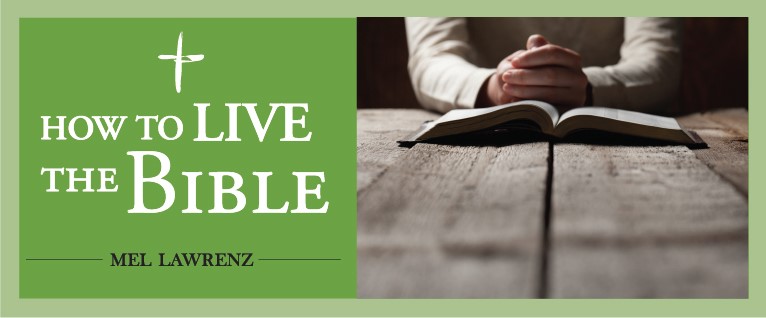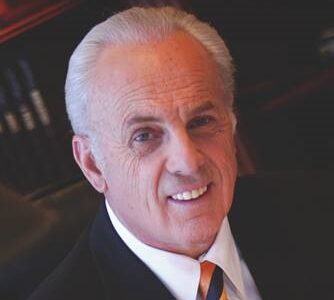
This is the one-hundred-fortieth lesson in author and pastor Mel Lawrenz’ How to Live the Bible series. If you know someone or a group who would like to follow along on this journey through Scripture, they can get more info and sign up to receive these essays via email here.
On March 4, 1865, President Abraham Lincoln gave a short speech for his second inauguration. The weather was foul. It had rained for weeks in Washington, turning Pennsylvania Avenue into a sea of mud. The crowd stood in the muck at the base of the Capitol’s steps, its stately new dome one sign of hope the nation might actually survive its trauma. Journalist Noah Brooks was there and reported that, as Lincoln got up from his seat, “A roar of applause shook the air, and, again and again repeated, finally dying away on the outer fringe of the throng, like a sweeping wave upon the shore.” Then Brooks says, “Just at that moment the sun, which had been obscured all day, burst forth in its unclouded meridian splendor and flooded the spectacle with glory and with light.” The journalist noted that Lincoln later said to him, “Did you notice that sunburst? It made my heart jump.”

The crowd listened in profound silence.
The words no doubt planted themselves in the people’s consciousness immediately, tense and poignant as those late Civil War days were. But, according to Brooks, “chiefly memorable in the mind of those who saw that second inauguration must still remain the tall, pathetic, melancholy figure of the man who, then inducted into office in the midst of the glad acclaim of thousands of people, and illumined by the deceptive brilliance of a March sunburst, was already standing in the shadow of death.”
Within weeks, Lincoln would be shot dead.
“With malice toward none, with charity for all… to do all which may achieve and cherish a just and lasting peace….”
I talk to people all the time whose main search in life is for one simple thing: a place of peace. They would welcome a whole day without fighting in the home. They would be thrilled to have a week of work without feeling beat up. Might a cabin provide that place of peace? A boat? Some unclaimed corner of the house? But most realize that the place of peace must reside in the heart. For, however many external storms there are, and however hard the lightning snaps and the mud grabs at your feet, the battle is really inside.
We find real peace in Christ. “For God was pleased to have all his fullness dwell in him [in Christ], and through him to reconcile to himself all things, whether things on earth or things in heaven, by making peace through his blood, shed on the cross” (Colossians 1:19-20; italics mine).
God knows, he really knows, just how intense the wars on earth are. Civil wars are the massacre of civil brotherhood, but God knows that they, too, kill humanity—the dismemberment of Adam. I’ve talked to many people who’ve been robbed, or raped, or mugged, and they always talk about the utter and complete violation of self that occurred, and that’s why they sleep fitfully. To God, it’s that, plus a desecration of the sanctuary that is a human person. When an evil deed despoils a human person it’s like spilling blood in a temple. No wonder we want peace. No wonder God wants peace.
We want it not just because we want to stop the bruising and the beating. You don’t have peace in your life if you can merely write in your diary at the end of the day, “Thank God, nobody beat me up today.” If a husband and wife can stop bickering, but still live in the ice-cold atmosphere of indifference, that isn’t exactly peace.
Peace has to do with order, “the tranquility of order” as Augustine called it so many centuries ago. It means living in the reality of the way things truly stack up in life—as God defines life. That ordered peace is like the security a child senses from parents who draw clear boundaries by appropriately saying “no” and “yes.” Peace comes from the ordering of the pieces of life—top things on top, and down from there.
That means seeing God as the top. It means letting the high things shape the lower things. It’s boyfriend treating girlfriend on the basis of principle and not just hormones. It’s being a citizen and not just a consumer. It’s being a reconciler and not just a competitor.
___________
Sign up to receive the free once-a-week email series, How to Live the Bible, by author and pastor Dr. Mel Lawrenz
<!– –>
By submitting your email address, you understand that you will receive email communications from Bible Gateway, a division of The Zondervan Corporation, 3900 Sparks Drive SE, Grand Rapids, MI 49546 USA, including commercial communications and messages from partners of Bible Gateway. You may unsubscribe from Bible Gateway’s emails at any time. If you have any questions, please review our Privacy Policy or email us at privacy@biblegateway.com.
Array
(
[template] => /mnt/www/blog_biblegateway_com/releases/20201102134928/wp-content/plugins/harpercollins_silverpop_wordpress_plugin/public/partials/form.php
[vars] => Array
(
[attr] => Array
(
[headline] => Sign up to receive the free once-a-week email series, How to Live the Bible, by author and pastor Dr. Mel Lawrenz
[background] => #952004
[image] => placehold.png
[text_color] =>
[template] => /mnt/www/blog_biblegateway_com/releases/20201102134928/wp-content/plugins/harpercollins_silverpop_wordpress_plugin/public/partials/form.php
[code] => bgblog-mel-lawrenz-em-d-4fc4e952a7
)
[fields] => Array
(
[name] => mel-lawrenz
[list] => how_to_live_the_bible
[blog_form] => Yes
)
[content] =>
[site_key] => 6LdMkEkUAAAAAGd5aGH1cwku1OFyHwKYW_QUDZxm
[form_number] => 1
[domain] => biblegateway.com
)
[template_path] => /mnt/www/blog_biblegateway_com/releases/20201102134928/wp-content/plugins/harpercollins_silverpop_wordpress_plugin/public/partials/form.php
[attr] => Array
(
[headline] => Sign up to receive the free once-a-week email series, How to Live the Bible, by author and pastor Dr. Mel Lawrenz
[background] => #952004
[image] => placehold.png
[text_color] =>
[template] => /mnt/www/blog_biblegateway_com/releases/20201102134928/wp-content/plugins/harpercollins_silverpop_wordpress_plugin/public/partials/form.php
[code] => bgblog-mel-lawrenz-em-d-4fc4e952a7
)
[fields] => Array
(
[name] => mel-lawrenz
[blog_form] => Yes
)
[content] =>
[site_key] => 6LdMkEkUAAAAAGd5aGH1cwku1OFyHwKYW_QUDZxm
[form_number] => 1
[domain] => biblegateway.com
[value] => Yes
[name] => blog_form
)
___________
[If you believe this series will be helpful, this is the perfect time to forward this to a friend, a group, or a congregation, and tell them they too may sign up for the weekly emails here]
Mel Lawrenz (@MelLawrenz) trains an international network of Christian leaders, ministry pioneers, and thought-leaders. He served as senior pastor of Elmbrook Church in Brookfield, Wisconsin, for ten years and now serves as Elmbrook’s teaching pastor. He has a PhD in the history of Christian thought and is on the adjunct faculty of Trinity International University. Mel’s many books include Spiritual Leadership Today: Having Deep Influence in Every Walk of Life (Zondervan, 2016). See more of Mel’s writing at WordWay.
The post How to Live the Bible — Peace With God appeared first on Bible Gateway Blog.










